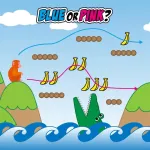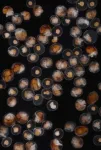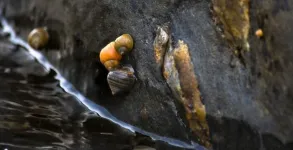(Press-News.org) In and out of the workplace, people often keep adverse information about themselves secret because they worry that others will judge them harshly. But those fears are overblown, according to new research from the McCombs School of Business.
In fact, when study participants pushed through fear to reveal a secret, those in whom they confided were significantly more charitable than they expected.
“When we’re thinking about conveying negative information about ourselves, we’re focused on the content of the message,” said study co-author Amit Kumar, assistant professor of marketing at Texas McCombs. “But the recipients are thinking about the positive traits required to reveal this secret, such as trust, honesty, and vulnerability.”
Kumar cites several key takeaways from the 12 experiments in his paper, co-authored with Michael Kardas of Oklahoma State University and Nicholas Epley of the University of Chicago.
Too-Low Expectations. Researchers asked several groups to imagine revealing a negative secret and to predict how another person would judge them. Then they asked each participant to reveal the secret to that person, and they gathered the recipients’ responses. The expected judgment was consistently worse than the actual judgment.
Miscalibrated Expectations. People were driven to reveal or conceal based on how they thought others would evaluate them. “If we believe other people will think we’re less trustworthy, that can really impact our decision to conceal information,” Kumar says.
In the experiments, though, disclosure had the opposite effect. Recipients rated the revealers’ honesty and trustworthiness more highly than the revealers expected.
Across Relationships. Participants divulged secrets to strangers, acquaintances, close friends, family members, and romantic partners — all with similar results. Says Kumar, “Their expectations were slightly more accurate for close others, but they were still systematically miscalibrated, even for the closest people in their lives.”
Dark vs. Light Secrets. The participants revealed a wide range of negative information, from admitting they had never learned to ride a bike to confessing infidelity. They predicted that more serious secrets would generate worse judgments.
But even for darker secrets, they still overestimated the impact. “The magnitude of what you’re revealing can impact people’s evaluations, but it also impacts your expectations of those evaluations,” Kumar says.
Honesty Feels Good. In one study, researchers told participants what they had learned: that people overestimate the negative impact of revelations. The news shifted participants’ attitudes toward more openness.
When challenged to confess that they had told a lie, only 56% of participants did. But in another group, where participants were told they would probably not be judged harshly, 92% chose to reveal their lies.
“There’s a psychological burden associated with secrecy,” says Kumar. “If we can alter people’s expectations to make them more in line with reality, they might be more transparent in their relationships.”
Building Trust With Co-workers. Although none of the experiments were run in business settings, Kumar says the lessons can be applied there.
“Any comprehensive understanding of how to navigate the workplace includes a better understanding of how people think, feel, and behave,” he says. “When workplace transgressions arise, people could be wise to consider that they also reveal warmth, trust, and honesty when they are open and transparent about revealing negative information.”
“Let It Go: How Exaggerating the Reputational Costs of Revealing Negative Information Encourages Secrecy in Relationships” is published in the Journal of Personality and Social Psychology.
Watch a video interview with the researcher: https://www.youtube.com/watch?v=AgZ2dPFnu_o
END
The (wrong) reason we keep secrets
Revealing negative things about ourselves does not cause the damage we think it will
2024-01-04
ELSE PRESS RELEASES FROM THIS DATE:
Variants in PPFIA3, a synaptic scaffolding protein, discovered to be the cause of a newly recognized syndromic neurodevelopmental disorder.
2024-01-04
An international collaborative study led by postdoctoral scientist, Dr. Maimuna Paul, and child neurologist, Dr. Hsiao-Tuan Chao, an assistant professor at Baylor College, a faculty member with the Cain Pediatric Neurology Research Foundation Laboratories at the Jan and Dan Duncan Neurological Research Institute (Duncan NRI) at Texas Children’s Hospital, and an investigator at the McNair Medical Institute with The Robert and Janice McNair Foundation, recently discovered that variants in the PPFIA3 gene ...
Focused on author support and research integrity, Science journals adopt Proofig software
2024-01-04
As part of continued efforts to bolster the integrity of the scholarly record, the Science journals have partnered with Proofig AI image integrity software.
Adoption of Proofig AI positions authors to resolve image-related issues before a paper is published. It also ensures the highest standards of accuracy in work published in the six Science family journals.
“Rigorous data are a cornerstone of our publications,” said Valda Vinson, Executive Editor of Science. “Image manipulation and duplication ...
Lighting the circuits to risky decision-making
2024-01-04
Life consists of infinite possibilities — appearing in the real world as multiple choices, that then require decision-making in order to determine the best course of action. However, with every choice there also exists a certain amount of uncertainty or ‘risk’. Therefore, behind every decision, lies an intricate evaluation process that balances the ‘risks’ and ‘rewards’ associated with taking such actions. This can, in extreme cases, manifest itself as a pathological behavioral state of high risk-high return (HH) and low risk-low return (LL) decision processing that has been associated with gambling disorders.
Although ...
The snail or the egg?
2024-01-04
The egg did come first. Egg-laying arose deep in evolutionary time, long before animals even made their way onto land. Throughout evolution, there have been many independent transitions to live-bearing across the animal kingdom, including insects, fish, reptiles, and mammals. Yet, these examples have taught us very little about the number of genetic changes it takes to go from eggs to live offspring.
Now, an international team of researchers led by ISTA postdoc Sean Stankowski has used a humble marine snail to reveal the genetic changes that underpin the transition to live-bearing. The main advantage of investigating this phenomenon in ...
Human histories shape the global biodiversity data used to make future decisions
2024-01-04
Global biodiversity data used to make major policy and conservation investment decisions reflect legacies of social and political inequities. In a Policy Forum, Melissa Chapman and colleagues highlight this issue and its implications for global conservation policy and planning. The rapid rise of global biodiversity data repositories like the Global Biodiversity Information Facility (GBIF) – a data repository that synthesizes billions of species observations across the globe – has led to unprecedented insight into large-scale biodiversity patterns worldwide. Not only are ...
Studies reveal the evolutionary origin of unique traits in pitcher plants and marine snails
2024-01-04
In a pair of studies, researchers use different approaches to investigate how complex and innovative phenotypic traits evolve in plants and animals. “The amazing breadth of plant and animal diversity across the globe has evolved by circuitous paths, and resolving the complex history of genomes and traits unlocks new depths for understanding evolution,” writes Kathryn Elmer in a related Perspective. Although biological traits are constantly changing in populations, the emergence of a trait ...
Anti-CTLA-4 nanobodies promote antitumor immunity without inducing colitis in mice
2024-01-04
Microbiota-reactive T cells trigger colitis in mice harboring the microbiota of wild-caught mice following CTLA-4 blockade, according to a new study that reveals a major mechanism by which anti-CTLA-4 antibodies induce inflammatory toxicities during antitumor immune checkpoint inhibitor therapies. The findings could advance the development of next-generation CTLA-4 inhibitors that promote antitumor immune responses without triggering intestinal disease. Cancer immunotherapies with immune checkpoint inhibitors are widely used to promote antitumor immune responses in a range of human cancers. However, they can also lead to inflammatory ...
Editorial: Genuine images in 2024
2024-01-04
In an Editorial, Science Journals’ Editor-in-Chief, Holden Thorp, outlines changes to the publication’s editorial policies and practices for 2024, including plans to adopt the use of Proofig – an artificial intelligence-powered image-analysis tool – to detect altered images across all six of the Science family journals. Proofig is a tool that screens images for duplication and other types of manipulations. Although Science has been conducting “human-eye” image checks on some papers, the new tool will enhance Science’s review process and reduce ...
Biologists uncover the secrets of evolutionary change
2024-01-04
**Strictly embargoed until 19:00 GMT on Thursday 4 January 2024**
Biologists uncover the secrets of evolutionary change
Images available here
Big evolutionary changes happen gradually and not in giant leaps, a team of biologists led by the University of Sheffield have discovered
Using new methodology to study an evolutionary shift in the birthing style of marine snails, experts have been able to answer the long-debated question as to how game-changing innovations like flight, vision, and the bearing of live offspring happened
Understanding the evolutionary origin of these developments is important because ...
Does self-checkout impact grocery store loyalty?
2024-01-04
In an effort to reduce costs and improve customer satisfaction, retailers have implemented self-checkouts in stores across the country. They have become increasingly popular, but some brands like Walmart are removing self-checkouts in some locations while adding more in others. There are many advantages and disadvantages of self-checkout for both the customer and the retailer, but little formal research has investigated the impact of self-checkout on customers’ shopping experience. This led researchers from Drexel University’s LeBow College of Business to look at how self-checkout systems in grocery stores influence customer loyalty ...
LAST 30 PRESS RELEASES:
Yale study challenges notion that aging means decline, finds many older adults improve over time
Korean researchers enable early detection of brain disorders with a single drop of saliva!
Swipe right, but safer
Duke-NUS scientists identify more effective way to detect poultry viruses in live markets
Low-intensity treadmill exercise preconditioning mitigates post-stroke injury in mouse models
How moss helped solve a grave-robbing mystery
How much sleep do teens get? Six-seven hours.
Patients regain weight rapidly after stopping weight loss drugs – but still keep off a quarter of weight lost
GLP-1 diabetes drugs linked to reduced risk of addiction and substance-related death
Councils face industry legal threats for campaigns warning against wood burning stoves
GLP-1 medications get at the heart of addiction: study
Global trauma study highlights shared learning as interest in whole blood resurges
Almost a third of Gen Z men agree a wife should obey her husband
Trapping light on thermal photodetectors shatters speed records
New review highlights the future of tubular solid oxide fuel cells for clean energy systems
Pig farm ammonia pollution may indirectly accelerate climate warming, new study finds
Modified biochar helps compost retain nitrogen and build richer soil organic matter
First gene regulation clinical trials for epilepsy show promising results
Life-changing drug identified for children with rare epilepsy
Husker researchers collaborate to explore fear of spiders
Mayo Clinic researchers discover hidden brain map that may improve epilepsy care
NYCST announces Round 2 Awards for space technology projects
How the Dobbs decision and abortion restrictions changed where medical students apply to residency programs
Microwave frying can help lower oil content for healthier French fries
In MS, wearable sensors may help identify people at risk of worsening disability
Study: Football associated with nearly one in five brain injuries in youth sports
Machine-learning immune-system analysis study may hold clues to personalized medicine
A promising potential therapeutic strategy for Rett syndrome
How time changes impact public sentiment in the U.S.
Analysis of charred food in pot reveals that prehistoric Europeans had surprisingly complex cuisines
[Press-News.org] The (wrong) reason we keep secretsRevealing negative things about ourselves does not cause the damage we think it will


